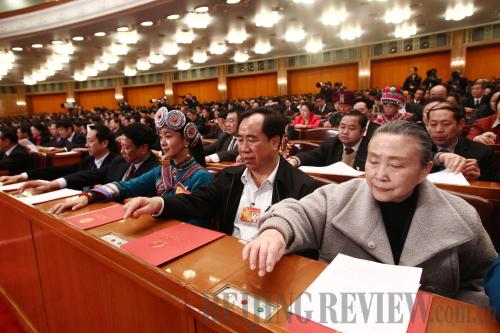|
 |
|
DECIDING VOTE: Deputies to the Third Session of the 11th National People's Congress press buttons to vote during the closing meeting at the Great Hall of the People in Beijing on March 14 (LIU WEIBING) |
An amendment to the Electoral Law of the National People's Congress and Local People's Congresses of the People's Republic of China granting equal representation in legislative bodies to rural and urban people was ratified by the National People's Congress (NPC), China's top legislature, on March 14.
The amendment is paramount to improving the people's congress system and developing China's socialist democracy, as it can further demonstrate equality among people, regions and ethnic groups, said Vice Chairman of the NPC Standing Committee Wang Zhaoguo.
The amendment was approved with 2,747 votes from 2,909 NPC deputies present at the closing meeting of the Third Session of the 11th NPC.
Time for change
Discussion over a draft amendment to the Electoral Law had been set aside for the annual session of the NPC for a third reading on March 8.
The first and second deliberations were held at the bimonthly legislative sessions of the 11th NPC Standing Committee in October and December last year.
It is the fifth amendment to the Electoral Law since the law was completely revised in 1979.
Unprecedentedly, the amendment grants equal representation in legislative bodies to China's rural and urban people, said Wang.
The change was made to fix imbalances in lawmaking representative elections, said Han Dayuan, a Chinese Constitution law professor with the Renmin University of China in Beijing.
After the amendment in 1995, the law stipulated that each rural deputy represented a population four times that of an urban deputy. Critics said this could be interpreted as "farmers only enjoy a quarter of the suffrage of their urban counterparts."
According to official calculations, this means some 960,000 rural people are represented by one NPC deputy, while 240,000 urban residents enjoy the same, single deputy representation, Han said.
The imbalance in representation among lawmakers started in 1953, when the first version of the Electoral Law was adopted, Han said. The law then stipulated that every 800,000 people would have one NPC deputy, but in municipalities and cities with a population of more than 500,000, every 100,000 people could have a NPC deputy.
The number of people represented by each rural NPC deputy at that time was eight times that represented by each urban deputy, Han said.
"Such stipulations were absolutely necessary and conformed with China's political system and the particular situation at that time," Wang said.
According to the 1953 national census, the urban population made up only 13.26 percent. Since the rural population far outnumbered that of the cities, an equal ratio of rural-urban representation could have resulted in an excessive number of rural deputies.
Now, with rapid urbanization and rural economic development, the urban population proportion has increased to 46.6 percent as of last year, a substantial boost from 29.04 percent in 1995, Wang said, adding that people's congresses at all levels have gone through many electoral terms, accumulating a wealth of experience and knowledge.
"The actual conditions are in place for revising the Electoral Law and electing deputies to the people's congresses based on the same population ratio in urban and rural areas," he said.
Equal rights
Electing deputies based on the same population ratio in urban and rural areas reflects equality among people, Wang said.
Wang said that ethnic groups with the smallest population must also have one deputy in order to reflect equality among ethnic groups.
"We cannot emphasize any one of them while ignoring the others," he said, adding appropriate consideration should be given to those regions where representative figures in all sectors of society are relatively concentrated.
The law does not specify the exact population a lawmaker would represent and the top legislature will decide the specific ratio in the near future.
Cai Dingjian, Director of the Constitution Research Center with the China University of Political Science and Law, said the realization of the equal rights between urban and rural areas will have a major impact on distribution of deputy quotas.
"For example, quotas for Beijing and Shanghai, which have a small rural population, may decrease while the quotas for big rural provinces, such as Sichuan and Anhui, may increase," he said.
He said the revision, considered major progress in the development of democracy in China, would help increase the number of farmer deputies to the NPC.
"The equality of political rights will lay the foundation for equality of many other rights, such as economic rights, educational rights and social and cultural rights," Cai said.
Farmer deputies are more familiar with the situation in the countryside and the change will help the top legislature better understand rural areas and make more scientific decisions, said Xu Anbiao, a member of the Legislative Affairs Committee of the NPC Standing Committee.
| 